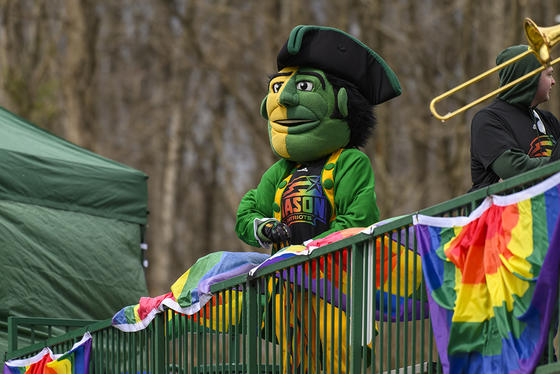“Queer people have been here forever, and we are an integral part of the community.”

With that powerful statement, Lisa Thrasher, George Mason University associate professor of film business and producing and independent film producer, concluded her presentation. Focusing on her work in making space at the proverbial table of film production for marginalized voices, Thrasher showed a collection of select clips from her films, all of which centered LGBTQ+ stories, voices, writers, and directors.
Thrasher and McKinley Green, assistant professor of English, presented their research as part of the inaugural LGBTQ+ Faculty Fellows Symposium, a new event added to the slate of activities and events commemorating Mason Pride Week.
While most of the nation celebrates Pride Month in June, Mason’s LGBTQ+ Resources Center hosts Pride Week during spring semester. This allows the whole campus community to be involved and also gives students who may not feel comfortable or safe participating in Pride Month events at home a chance to celebrate.
Josh Kinchen, director of the LGBTQ+ Resources Center, notes that many of the Pride Week events are developed and hosted not by the LGBTQ+ Resources Center, but by offices around campus, such as the Global Education Office’s “Tips for LGBTQ+ Travelers Abroad” seminar, for example, or “LGBTQ+ Literacies for Our Future,” part of the Leadership Summit series hosted by the School of Integrative Studies, LEAD Office, and the Center for Culture, Equity, and Empowerment.
“Mason Pride Week is a Mason event—the whole community is involved, coming together to celebrate, educate, and support LGBTQ+ students, faculty, and staff so everyone can have a positive and affirming experience at Mason,” Kinchen said. “Everyone can feel a connection to Mason through the work we do.”
Victoria Barrett, one of the graduate assistants for the LGBTQ+ Resources Center, believes that the is one of the most valuable aspects of Pride Week. “It shows that this isn’t just one niche part of campus; the support is campus-wide,” she said.
Barrett served seven years in the United States Army and is now working toward her master’s degree in higher education and student development. “Things were much different when I was an undergrad,” Barrett said. “I’m sure their LGBTQ+ community did events, but they weren’t as visible. And when I was commissioned as an officer, ‘Don’t Ask, Don’t Tell’ had just been repealed, so the culture of keeping quiet hadn’t shifted yet. I was nervous about sharing my true self. But so much has changed over the past 10 years. Now, I’m able to make things different for other students, to give them a better experience than what I had.
“I’m really grateful and proud to have a part in making this community welcome to all.”
That dedication to a welcoming and supportive campus climate is what keeps Mason at the top of the Campus Pride Index and the Athlete Ally’s Athletic Equality Index. The university has maintained perfect scores on both indexes for multiple years.
“It takes work to maintain those designations. We must keep improving the ways in which we support all our students,” Kinchen said.
Pride Week’s focus on education is deliberate, Kinchen added. “We’re making an intentional shift toward expanding our partnerships and educational opportunities,” said Kinchen, “like giving faculty who are doing relevant research a platform to share their work, discussing student opportunities for civic engagement, and deepening our knowledge of LGBTQ+ history.”
This transition is one that the center is bringing into their year-round connection to the academic mission of the university.
“There are faculty, staff, and students in every single college, school, and unit at Mason doing work and engaging in research that’s relevant to the center. We want to work on deepening those connections to support both faculty engagement and student learning,” said Kinchen.
People Mentioned in This Story
Related News
- April 8, 2024
- February 5, 2024
- January 5, 2024
- August 31, 2023
- June 16, 2023
